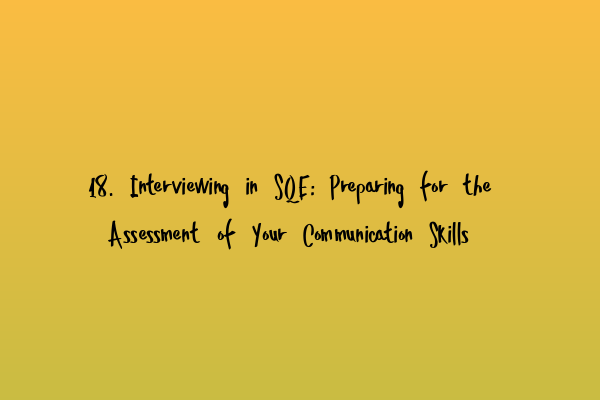Interviewing is an essential skill for any aspiring solicitor, and it is no different when it comes to the SQE (Solicitors Qualifying Examination). The SQE is a new exam that is set to replace the traditional training and qualification routes for solicitors in England and Wales. It consists of two stages: SQE1 and SQE2. In this blog post, we will focus on preparing for the assessment of your communication skills in the interview portion of the SQE.
Why is Communication Skills Assessment Important?
Effective communication is a cornerstone of the legal profession. As a solicitor, you will need to communicate clearly and persuasively with clients, colleagues, and the court. The assessment of your communication skills in the SQE interview is crucial because it allows the assessors to evaluate your ability to convey information, listen actively, and respond appropriately.
It is not just about being able to speak eloquently; it is also about being an active listener, demonstrating empathy, and having the ability to adapt your communication style to suit different situations and people. These skills are vital for building strong relationships with clients and colleagues and for effectively advocating for your clients’ interests.
How to Prepare for the Communication Skills Assessment
Preparing for the communication skills assessment in the SQE interview requires a combination of knowledge, practice, and self-reflection. Here are some tips to help you prepare:
1. Understand the Assessment Criteria
Before you start preparing, make sure you have a clear understanding of the assessment criteria. The SQE examiners have provided detailed guidance on what they will be looking for in the communication skills assessment. Familiarize yourself with this information so you can tailor your preparation accordingly.
2. Study Relevant Legal Principles and Procedures
In order to effectively communicate as a solicitor, you need to have a solid understanding of the relevant legal principles and procedures. Take time to study and revise the key legal topics that are likely to come up in the interview. This will help you feel more confident and articulate in your responses.
Our SQE 1 Preparation Courses are designed to help you master the necessary legal knowledge for the exam.
3. Practice Interview Scenarios
Practice makes perfect, and this is especially true when it comes to improving your communication skills. Set aside time to practice interview scenarios with a partner or even by recording yourself and reviewing your performance. Focus on speaking clearly, organizing your thoughts, and engaging in active listening.
If you are looking for additional practice, our SQE 1 Practice Mocks FLK1 FLK2 can provide you with realistic interview scenarios to help you hone your skills.
4. Seek Feedback and Self-Reflect
Constructive feedback is invaluable when trying to improve your communication skills. Seek feedback from friends, family, or mentors after practicing interview scenarios. Take note of areas where you can improve and work on incorporating these suggestions into your next practice session.
Additionally, take the time to reflect on your own performance. After each practice interview, ask yourself what went well and what could have been better. Use this self-reflection to fine-tune your approach and identify areas for improvement.
5. Emulate Professional Solicitors
Observing and emulating the communication style of professional solicitors can be a valuable learning tool. Watch recordings of solicitors in action, attend court proceedings, or participate in mock trials to familiarize yourself with the language, tone, and demeanor expected of a solicitor.
Conclusion
The communication skills assessment in the SQE interview is an opportunity for you to demonstrate your ability to effectively communicate as a solicitor. By understanding the assessment criteria, studying relevant legal principles, practicing interview scenarios, seeking feedback, and emulating professional solicitors, you can prepare yourself for success in this assessment.
Remember, effective communication skills are essential not just for the SQE exam but for a successful legal career. Keep honing your skills and seeking opportunities to improve even after you have passed the SQE.
For more resources to help you prepare for the SQE exam, check out our SQE 1 Practice Exam Questions and our SQE 2 Preparation Courses. Also, make sure to stay up to date on the latest exam dates by visiting our page on SRA SQE Exam Dates.
